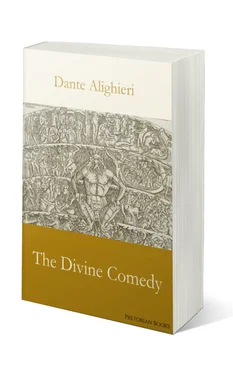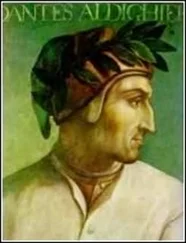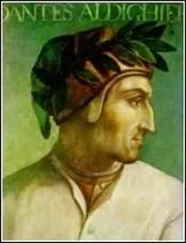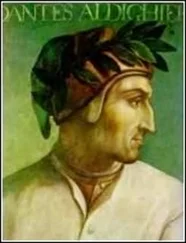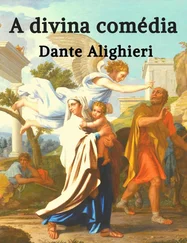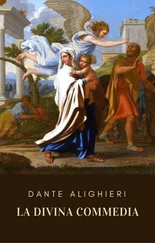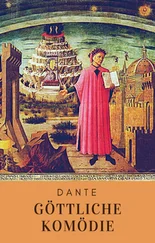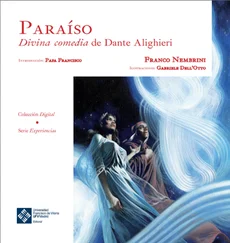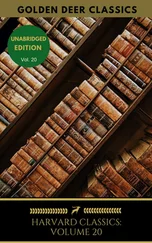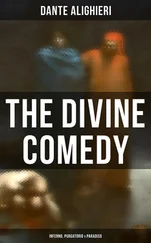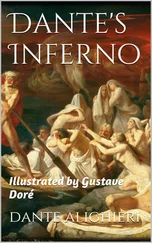And seems too woe-begone to drop a tear.
How yet the regal aspect he retains!
Jason is he, whose skill and prowess won
The ram from Colchos. To the Lemnian isle
His passage thither led him, when those bold
And pitiless women had slain all their males.
There he with tokens and fair witching words
Hypsipyle beguil'd, a virgin young,
Who first had all the rest herself beguil'd.
Impregnated he left her there forlorn.
Such is the guilt condemns him to this pain.
Here too Medea's inj'ries are avenged.
All bear him company, who like deceit
To his have practis'd. And thus much to know
Of the first vale suffice thee, and of those
Whom its keen torments urge." Now had we come
Where, crossing the next pier, the straighten'd path
Bestrides its shoulders to another arch.
Hence in the second chasm we heard the ghosts,
Who jibber in low melancholy sounds,
With wide-stretch'd nostrils snort, and on themselves
Smite with their palms. Upon the banks a scurf
From the foul steam condens'd, encrusting hung,
That held sharp combat with the sight and smell.
So hollow is the depth, that from no part,
Save on the summit of the rocky span,
Could I distinguish aught. Thus far we came;
And thence I saw, within the foss below,
A crowd immers'd in ordure, that appear'd
Draff of the human body. There beneath
Searching with eye inquisitive, I mark'd
One with his head so grim'd, 't were hard to deem,
If he were clerk or layman. Loud he cried:
"Why greedily thus bendest more on me,
Than on these other filthy ones, thy ken?"
"Because if true my mem'ry," I replied,
"I heretofore have seen thee with dry locks,
And thou Alessio art of Lucca sprung.
Therefore than all the rest I scan thee more."
Then beating on his brain these words he spake:
"Me thus low down my flatteries have sunk,
Wherewith I ne'er enough could glut my tongue."
My leader thus: "A little further stretch
Thy face, that thou the visage well mayst note
Of that besotted, sluttish courtezan,
Who there doth rend her with defiled nails,
Now crouching down, now risen on her feet.
"Thais is this, the harlot, whose false lip
Answer'd her doting paramour that ask'd,
'Thankest me much!'—'Say rather wondrously,'
And seeing this here satiate be our view."
WOE to thee, Simon Magus! woe to you,
His wretched followers! who the things of God,
Which should be wedded unto goodness, them,
Rapacious as ye are, do prostitute
For gold and silver in adultery!
Now must the trumpet sound for you, since yours
Is the third chasm. Upon the following vault
We now had mounted, where the rock impends
Directly o'er the centre of the foss.
Wisdom Supreme! how wonderful the art,
Which thou dost manifest in heaven, in earth,
And in the evil world, how just a meed
Allotting by thy virtue unto all!
I saw the livid stone, throughout the sides
And in its bottom full of apertures,
All equal in their width, and circular each,
Nor ample less nor larger they appear'd
Than in Saint John's fair dome of me belov'd
Those fram'd to hold the pure baptismal streams,
One of the which I brake, some few years past,
To save a whelming infant; and be this
A seal to undeceive whoever doubts
The motive of my deed. From out the mouth
Of every one, emerg'd a sinner's feet
And of the legs high upward as the calf
The rest beneath was hid. On either foot
The soles were burning, whence the flexile joints
Glanc'd with such violent motion, as had snapt
Asunder cords or twisted withs. As flame,
Feeding on unctuous matter, glides along
The surface, scarcely touching where it moves;
So here, from heel to point, glided the flames.
"Master! say who is he, than all the rest
Glancing in fiercer agony, on whom
A ruddier flame doth prey?" I thus inquir'd.
"If thou be willing," he replied, "that I
Carry thee down, where least the slope bank falls,
He of himself shall tell thee and his wrongs."
I then: "As pleases thee to me is best.
Thou art my lord; and know'st that ne'er I quit
Thy will: what silence hides that knowest thou."
Thereat on the fourth pier we came, we turn'd,
And on our left descended to the depth,
A narrow strait and perforated close.
Nor from his side my leader set me down,
Till to his orifice he brought, whose limb
Quiv'ring express'd his pang. "Whoe'er thou art,
Sad spirit! thus revers'd, and as a stake
Driv'n in the soil!" I in these words began,
"If thou be able, utter forth thy voice."
There stood I like the friar, that doth shrive
A wretch for murder doom'd, who e'en when fix'd,
Calleth him back, whence death awhile delays.
He shouted: "Ha! already standest there?
Already standest there, O Boniface!
By many a year the writing play'd me false.
So early dost thou surfeit with the wealth,
For which thou fearedst not in guile to take
The lovely lady, and then mangle her?"
I felt as those who, piercing not the drift
Of answer made them, stand as if expos'd
In mockery, nor know what to reply,
When Virgil thus admonish'd: "Tell him quick,
I am not he, not he, whom thou believ'st."
And I, as was enjoin'd me, straight replied.
That heard, the spirit all did wrench his feet,
And sighing next in woeful accent spake:
"What then of me requirest?" "If to know
So much imports thee, who I am, that thou
Hast therefore down the bank descended, learn
That in the mighty mantle I was rob'd,
And of a she-bear was indeed the son,
So eager to advance my whelps, that there
My having in my purse above I stow'd,
And here myself. Under my head are dragg'd
The rest, my predecessors in the guilt
Of simony. Stretch'd at their length they lie
Along an opening in the rock. 'Midst them
I also low shall fall, soon as he comes,
For whom I took thee, when so hastily
I question'd. But already longer time
Hath pass'd, since my souls kindled, and I thus
Upturn'd have stood, than is his doom to stand
Planted with fiery feet. For after him,
One yet of deeds more ugly shall arrive,
From forth the west, a shepherd without law,
Fated to cover both his form and mine.
He a new Jason shall be call'd, of whom
In Maccabees we read; and favour such
As to that priest his king indulgent show'd,
Shall be of France's monarch shown to him."
I know not if I here too far presum'd,
But in this strain I answer'd: "Tell me now,
What treasures from St. Peter at the first
Our Lord demanded, when he put the keys
Into his charge? Surely he ask'd no more
But, Follow me! Nor Peter nor the rest
Or gold or silver of Matthias took,
When lots were cast upon the forfeit place
Of the condemned soul. Abide thou then;
Thy punishment of right is merited:
And look thou well to that ill-gotten coin,
Which against Charles thy hardihood inspir'd.
If reverence of the keys restrain'd me not,
Which thou in happier time didst hold, I yet
Severer speech might use. Your avarice
O'ercasts the world with mourning, under foot
Treading the good, and raising bad men up.
Of shepherds, like to you, th' Evangelist
Was ware, when her, who sits upon the waves,
With kings in filthy whoredom he beheld,
She who with seven heads tower'd at her birth,
And from ten horns her proof of glory drew,
Читать дальше
